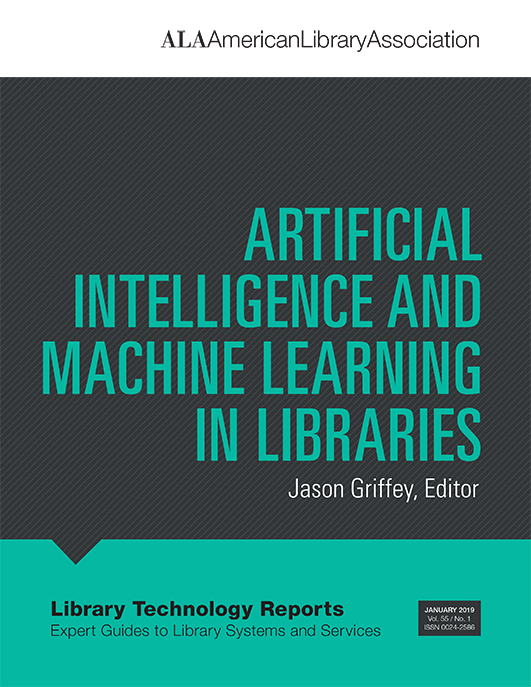Now available is a publication I’m particularly proud of, “Artificial Intelligence and Machine Learning in Libraries” from ALA Techsource. I edited the volume, as well as authoring two of the chapters. The real stars are the three other librarians who contributed: Bohyun Kim, Andromeda Yelton, and Craig Boman. Bohyun wrote up her experience at the University of Rhode Island in setting up the first library-based multidisciplinary Artificial Intelligence lab, Andromeda talked about the development and possible future of AI-based library search as illustrated by her fantastic service HAMLET, and finally Craig talked about his experience in attempting AI-driven subject assignment to materials.
I wrote the Introduction, where I try to give a summary of the current state of AI and Machine Learning systems, and show some examples of how they work and are structured in practice. I also am particularly proud of drawing a line from Mary Shelley to the Google Assistant…you’ll have to read it to get the full effect, but here’s a different section to whet your appetite for more AI talk:
What changes in our world when these nonhuman intelligences are no longer unique, or special, or even particularly rare? …. AI and machine learning are becoming so much a part of modern technological experience that often people don’t realize what they are experiencing is a machine learning system. Everyone who owns a smartphone, which in 2018 is 77 percent of the US population, has an AI system in their pocket, because both Google and Apple use AI and machine learning extensively in their mobile devices. AI is used in everything from giving driving directions to identifying objects and scenery in photographs, not to mention the systems behind each company’s artificial agent systems (Google Assistant and Siri, respectively). While we are admittedly still far from strong AI, the ubiquity of weak AI, machine learning, and other new human-like decision-making systems is both deeply concerning and wonderful.
I also wrote the Conclusion and suggested some further reading if people are really interested in diving deeper into the world of AI and ML. In the conclusion, I try to talk about some of the likely near-future aspects of AI, and the impact it is likely to have on the information professions, from individualized AI assistants to intelligent search. From the conclusion:
As with much of the modern world, automating the interaction between humans is often the most difficult challenge, while the interactions between humans and systems are less difficult and are the first to be automated away. In areas where human judgment is needed, we will instead be moving into a world where machine learning systems will abstract human judgment from a training set of many such judgments and learn how to apply a generalized rubric across any new decision point. This change will not require new systems short term, but in the longer term a move to entirely new types of search and discovery that have yet to be invented is very likely.
I hope this work is useful for librarians, libraries, library students, and any other information professional who is trying to wrap their heads around the possibilities and potential for Artificial Intelligence and the world of information creation, consumption, organization, and use.
If your organization would like to talk to me about AI or Machine Learning and how it might make a difference to your business or operations, please get in touch. I’d love to work with you.
